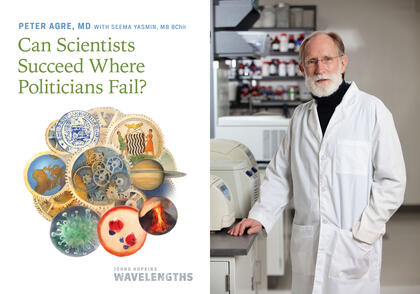Science begins with curiosity, the impulse to ask why and how until insight emerges. For Nobel laureate and Johns Hopkins Bloomberg Distinguished Professor Peter Agre, that curiosity was kindled in his Minnesota youth, where frozen landscapes fueled dreams of exotic destinations abroad.

Image credit: Johns Hopkins University Press; Chan Chao
His path was further shaped when his father, a chemistry professor at Augsburg College, hosted two-time Nobel laureate Linus Pauling, giving young Peter a chance to meet a scientist renowned for both scientific discovery and international peace. That encounter may have served as a road map that set Agre on a career both as a scientist—culminating in the discovery of aquaporins, the water-channel proteins that move water through cell membranes—and as a science diplomat, fostering dialogue and goodwill.
The new book Can Scientists Succeed Where Politicians Fail?, written by Agre with journalist Seema Yasmin, is both a personal narrative and call to action. Published today by Johns Hopkins University Press, the book highlights how science transcends borders and how scientists can act as ambassadors for peace and progress.
Agre brings humanity to the book. After being awarded the Nobel Prize in Chemistry in 2003, he used his scientific stature to build connections across political divides that took him to Cuba, Iran, North Korea, and other nations, some seen as adversaries. Through this diplomacy, Agre helped secure U.S. recognition for Cuban scientist Carlos Juan Finlay, whose role in the discovery of the yellow fever vector transformed global health. He gifted his own Nobel lecture tie to a North Korean official with the hope that it would one day be passed on to that country's first Nobel laureate.
The book confronts the challenges of science diplomacy, including political roadblocks and human rights issues. At the same time, it highlights the unique role scientists can play and serves as a reminder that, even in polarized times, science can be a unifying force, and that individuals, armed with curiosity and compassion, can make a profound difference.
The book is the ninth released as part of the Wavelengths program, launched in 2020 to bridge the academic and public spheres and bring the work of Bloomberg Distinguished Professors to the public. Wavelengths is a collaboration between the Office of the Vice Provost for Research and the JHU Press.






